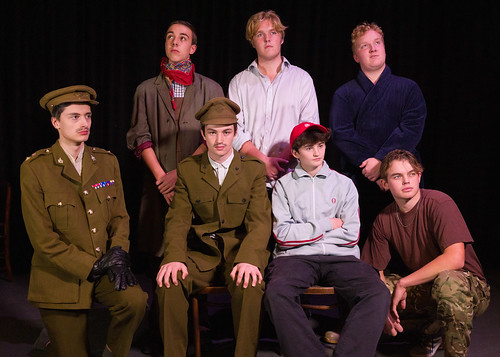.jpg?command_1=resize&width_1=220)
Lyon House presents "The Unreturning"...

The Lyon House play was described as a “tour de force” by a member of the audience, and a truer word was never spoken. Lyon House’s version of The Unreturning, by Anna Jordan was adapted and directed by Mr Stainton and it proved to be a powerful and moving play, that captivated the audience throughout and managed to address some incredibly serious issues at the same time. Joe and Tommy were stunning as the two main characters, and they were supported by some truly memorable performances from Adam, Samuel, Archie, Henry and Thomas. The acting was superb, the sound and the lighting added striking atmosphere, and the commitment of the boys, as well as Mr Stainton, was second to none. It was indeed a Tour de Force and the whole House was very proud of their efforts. Well done to all.
Malcolm Jeffrey - Lyon Housemaster
Three young men are coming home from war. Their stories, set at different times over a hundred years, are beautifully interwoven in Anna Jordan's The Unreturning, a play that explores the profound effect that war has on young people's lives, and asks - what does coming home really mean? What is home? In Lyon House’s adaptation, three stories have become two, focusing on the characters of George and Frankie.
“Without people,” he says about the place the man calls home, “it’s just bricks and rocks.” Except in The Unreturning home is very much in the bricks and rocks and there’s no “just” about it. In a play that unfolds across time to tell two parallel wartime stories, home is in the sand and the sea, the cliffs and the amusement arcades, the streets and the houses of Scarborough. The people, by contrast, variously misunderstand or reject the returning soldiers; that’s if they’re still there at all.
Structured like a string quartet, with its solos, duets and ensemble pieces, The Unreturning takes us to 1918, when an army private takes leave after the loss of his section in the trenches; to 2013, when a squaddie is sent back to face justice for attacking an Iraqi civilian. In each case, both the men and the home they left behind have changed. Scarborough is where they belong and where they no longer fit in.
The more Jordan develops the stories, the more she treads on familiar ground. The Christmas Day armistice on the western front, the soldier’s incapacity to describe the horror of battle, the emotional repression of the average bloke and the violent outbursts brought on by PTSD are standard-issue themes. It’s all sensitively and poetically done, however, and Jordan’s juxtaposition of the tales, the sense of repeated behaviour across the generations, the feeling of men continually sacrificing themselves for the greater social good, only adds to the poignancy.
.jpg)